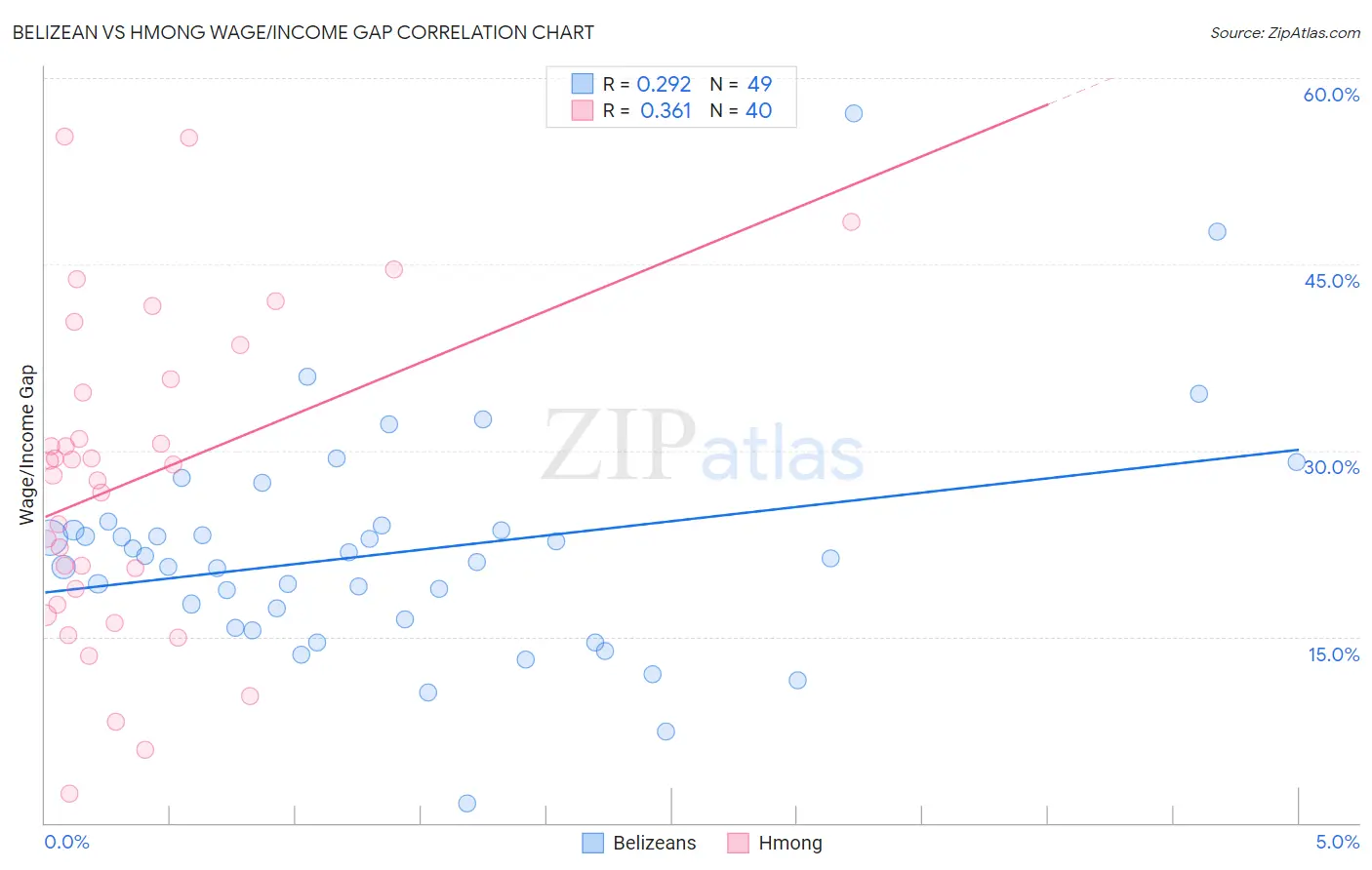Belizean vs Hmong Wage/Income Gap
COMPARE
Belizean
Hmong
Wage/Income Gap
Wage/Income Gap Comparison
Belizeans
Hmong
21.2%
WAGE/INCOME GAP
100.0/ 100
METRIC RATING
36th/ 347
METRIC RANK
27.7%
WAGE/INCOME GAP
1.0/ 100
METRIC RATING
266th/ 347
METRIC RANK
Belizean vs Hmong Wage/Income Gap Correlation Chart
The statistical analysis conducted on geographies consisting of 144,188,181 people shows a weak positive correlation between the proportion of Belizeans and wage/income gap percentage in the United States with a correlation coefficient (R) of 0.292 and weighted average of 21.2%. Similarly, the statistical analysis conducted on geographies consisting of 24,681,537 people shows a mild positive correlation between the proportion of Hmong and wage/income gap percentage in the United States with a correlation coefficient (R) of 0.361 and weighted average of 27.7%, a difference of 30.4%.

Wage/Income Gap Correlation Summary
| Measurement | Belizean | Hmong |
| Minimum | 1.6% | 2.4% |
| Maximum | 57.2% | 55.2% |
| Range | 55.6% | 52.9% |
| Mean | 21.8% | 27.5% |
| Median | 21.3% | 28.4% |
| Interquartile 25% (IQ1) | 16.1% | 18.2% |
| Interquartile 75% (IQ3) | 23.8% | 35.2% |
| Interquartile Range (IQR) | 7.7% | 17.0% |
| Standard Deviation (Sample) | 9.3% | 12.7% |
| Standard Deviation (Population) | 9.2% | 12.6% |
Similar Demographics by Wage/Income Gap
Demographics Similar to Belizeans by Wage/Income Gap
In terms of wage/income gap, the demographic groups most similar to Belizeans are Somali (21.2%, a difference of 0.020%), Immigrants from Somalia (21.2%, a difference of 0.070%), Immigrants from Belize (21.3%, a difference of 0.12%), Colville (21.3%, a difference of 0.23%), and Lumbee (21.3%, a difference of 0.43%).
| Demographics | Rating | Rank | Wage/Income Gap |
| Immigrants | Senegal | 100.0 /100 | #29 | Exceptional 20.9% |
| Immigrants | Bangladesh | 100.0 /100 | #30 | Exceptional 20.9% |
| Vietnamese | 100.0 /100 | #31 | Exceptional 21.0% |
| Immigrants | Yemen | 100.0 /100 | #32 | Exceptional 21.1% |
| Immigrants | Bahamas | 100.0 /100 | #33 | Exceptional 21.1% |
| Pima | 100.0 /100 | #34 | Exceptional 21.1% |
| Somalis | 100.0 /100 | #35 | Exceptional 21.2% |
| Belizeans | 100.0 /100 | #36 | Exceptional 21.2% |
| Immigrants | Somalia | 100.0 /100 | #37 | Exceptional 21.2% |
| Immigrants | Belize | 100.0 /100 | #38 | Exceptional 21.3% |
| Colville | 100.0 /100 | #39 | Exceptional 21.3% |
| Lumbee | 100.0 /100 | #40 | Exceptional 21.3% |
| Liberians | 100.0 /100 | #41 | Exceptional 21.4% |
| Immigrants | Sierra Leone | 100.0 /100 | #42 | Exceptional 21.4% |
| Sierra Leoneans | 100.0 /100 | #43 | Exceptional 21.4% |
Demographics Similar to Hmong by Wage/Income Gap
In terms of wage/income gap, the demographic groups most similar to Hmong are Serbian (27.7%, a difference of 0.0%), Immigrants from Switzerland (27.7%, a difference of 0.010%), Turkish (27.7%, a difference of 0.020%), New Zealander (27.7%, a difference of 0.10%), and Potawatomi (27.7%, a difference of 0.11%).
| Demographics | Rating | Rank | Wage/Income Gap |
| Icelanders | 1.8 /100 | #259 | Tragic 27.5% |
| Tongans | 1.7 /100 | #260 | Tragic 27.5% |
| Immigrants | Germany | 1.5 /100 | #261 | Tragic 27.5% |
| Immigrants | Lebanon | 1.5 /100 | #262 | Tragic 27.5% |
| Syrians | 1.4 /100 | #263 | Tragic 27.6% |
| Immigrants | Switzerland | 1.0 /100 | #264 | Tragic 27.7% |
| Serbians | 1.0 /100 | #265 | Tragic 27.7% |
| Hmong | 1.0 /100 | #266 | Tragic 27.7% |
| Turks | 1.0 /100 | #267 | Tragic 27.7% |
| New Zealanders | 1.0 /100 | #268 | Tragic 27.7% |
| Potawatomi | 0.9 /100 | #269 | Tragic 27.7% |
| Immigrants | Western Europe | 0.9 /100 | #270 | Tragic 27.8% |
| Ute | 0.8 /100 | #271 | Tragic 27.8% |
| Immigrants | Korea | 0.8 /100 | #272 | Tragic 27.8% |
| Bulgarians | 0.7 /100 | #273 | Tragic 27.8% |